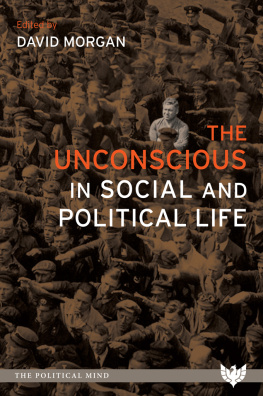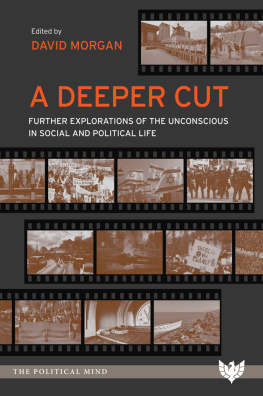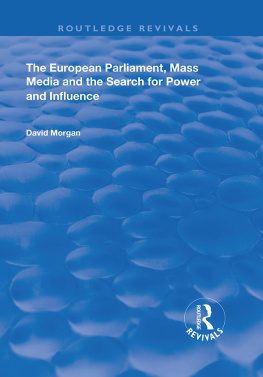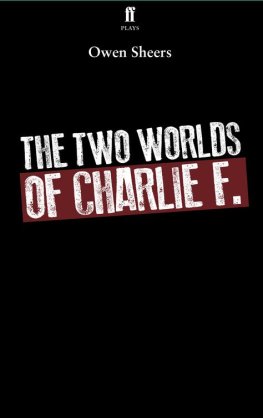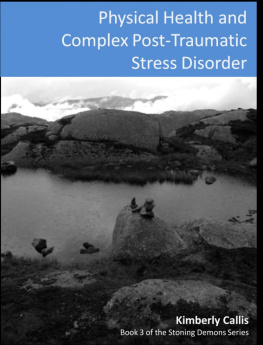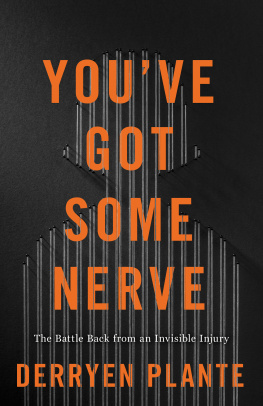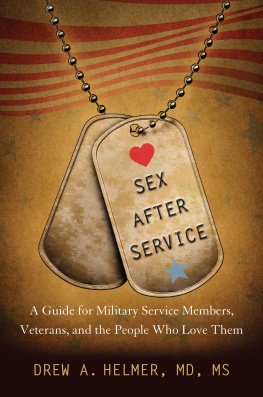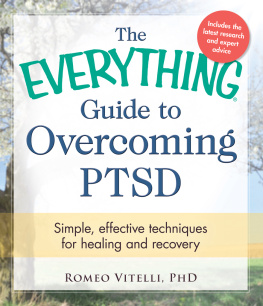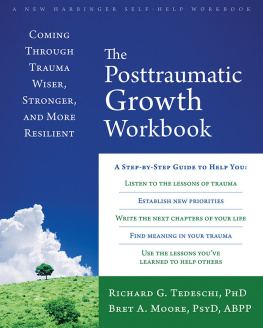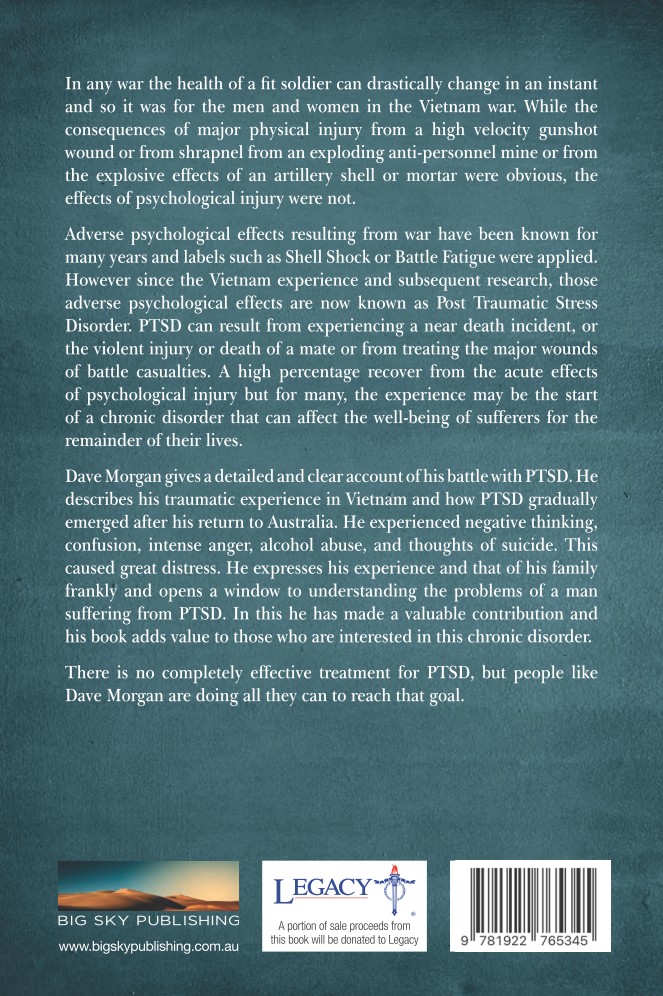ACKNOWLEDGEMENTS
I want to thank a few special people for their support.
David Murphy, a mate who served with me in Vietnam, contributed one of the Forewords and edited the book. David has a wealth of experience editing other veterans stories. His help was invaluable, and I believe I could not have completed my story without him.
I feel overwhelmed with the contributions of three doctors to the Foreword section. A special thank you to Dr Michael Naughton SMO Australian Army Force Vietnam (1965-66) and CO 1st Australian Field Hospital (1969-70) whom I met at a GMRF breakfast seminar for veterans sleep therapy study in 2019; to Dr Justine Evans Clinical Psychologist GMRF whom I met while attending a PTSD Programme at Greenslopes Private Hospital in 2015; and Dr Paul Cadzow, my Consultant Psychiatrist since 2009. I am very grateful for the effort and research Dr Sarah Hampton at GMRF put into her very clear explanation of CBT-I and IRT therapies and the benefits they offer sleep disorders. Her work appears in Chapter 29.
A special thank you to Graham McLoughlin, a very gifted poet and singer for contributing a poem which really hits the spot.
Also, thanks to the veterans for their contributions. I am profoundly grateful to Maureen Bronjes (MOZ) we met at Cooinda Mental Health Service PTSD programme; Andy Fermo I did a podcast for him on Invisible Injuries; Ian Fraser Dawson River Retreat; Michelle Fraser (daughter of Ian) Dawson River Retreat; and Jeanette Holland Cooinda Mental Health Service PTSD programme. Their personal stories My Experience on PTSD, added extra depth to my account of PTSD. I know it was not easy to write about your traumas and issues, so I admire you all.
My children, Michelle and David have been coping all their lives with my PTSD. They have now written here about how theyve been affected by it. My pride in them cant be put into words.
Finally, my wife, Debbie, has been my life-support for so many years. It was great that she was able to contribute The Last Word.
Dave Morgan
Sunshine Coast, Queensland
2022
CHAPTER 1
MY EARLY YEARS
I was born on the 4th of March 1948, in South Yarra, Melbourne, a fashionable seven minutes after my twin brother, Don. We were the new additions to a family which included two other children an older brother Gerald George who was 10 years of age and my sister Sybil Patricia, who was 8 at the time of our arrival. On September 9, 1947 just after Mum, Sybella fell pregnant with Don and I, my father Gerald Augustine Morgan known as Gus, died unexpectedly. He was in the Merchant Navy for most of his life and served during the Second World War and I wouldnt be surprised if he had PTSD as he had been a heavy smoker and drinker. I know my Mum suffered from depression, due to not only losing her husband that day, but the inheritance shed invested in the family caf business in Alice Springs after the War vanished with him. With no money and no income, my Mum single-handedly became the backbone of the family, shifting around different States to find work to support her young family. All this uncertainty, pressure and struggle caught up with her, causing depression.
Being a twin is special in my mind. We were identical, and no one could tell us apart. We got used to being called by each others name. Growing up we often teased our Mum about getting us mixed up when we were born, but as a mother she knew the difference. We were both born with red hair and blue eyes. Apparently, the difference was I had a chubby face compared to Don. I slept more while he was wider awake, active and alert. We were close in every way. Mum had to be careful to treat us the same; if not, one of us would get upset. We played together, laughed together, cried together, shared our friends together, and felt each others pain together.
Don was the boss, leader and more dominant than me, but I did not mind, I just followed him. He was always there for me. I remember when I was going home from school in Echuca one day when an aborigine boy started pushing and hitting me. Don jumped in and protected me and wrestled the aborigine boy to the ground causing him to run off. There were times when both of us got into trouble from Mum, but we always defended each other.
At school Don was more academic than me; he wanted to learn about things and study while I struggled and hated school. I was more of a dreamer. As we got older, we became more competitive with each other in the backyard, playing football, cricket or tennis. I think this started with me as I felt he was better than me at school, so I would try to outperform and beat him in the backyard. It did not work as he was just as determined as me to win. This caused a lot of heated fights, with poor Mum having to break them up.
My days growing up were the happiest days of my life, full of adventures, with my fondest memory being freedom. We were free to roam anywhere for adventure, like to a mates place, to the river or creek to go fishing, to the beach and to ride our bikes anywhere. Back then there was hardly any crime. People trusted each other, leaving house doors open and unlocked or leaving car windows down with the keys in the ignition or leaving a bike on the side path. Like all young kids I experienced different incidents like stitches in deep cuts, crushed fingers, haemorrhage after getting my tonsils out and a broken wrist.
At the time all the above incidents caused some stress and fear for me. I crushed my fingers by accidentally putting my left fingers in one of the swinging doors in the dining car on the Ghan train from Alice Springs to Adelaide. Two fingers were crushed so badly that the train conductors were considering a rendezvous with the Flying Doctor at the next siding. However, as luck would have it, there was a doctor on board the train and he stabilised the injury until we got back to civilisation in Adelaide. Two painful days later, my fingers had become infected. Mum took me straight to the Adelaide hospital where their first concern was that one or two of the fingers might need to be amputated. Fortunately, after a week of treatment at the hospital with antibiotics I was given the all clear by the doctor.
During the winters of Grade 3 and 4 at Echuca State School, Don and I came down with tonsillitis. Our family doctor, who did house calls, saw it as an ongoing problem and decided that our tonsils must come out. He booked Don and I into the hospital, with our operations scheduled for a month apart. As Don was older by those all-important seven minutes, he was set to face the operation first. Off he went bravely, apparently making good use of his 7 extra minutes of maturity and the operation was successful.
When my turn came, I was not as cooperative as Mum and the nursing staff would have liked. Understandably, I was scared. Mum took me to the hospital via taxi. At 6am, she tried to drop me off, but I stubbornly refused to go into the building. The old matron, in her sixties, tried to coax me inside but the thought of what awaited me there persuaded me to stand my ground. Having had no luck enticing me, dragging me in was the next strategy employed. I was small but agile and managed to get away. I ran for my life with the matron and the nurses chasing me up the driveway. It would have been an amusing sight I suppose, but at the time I was desperately bent on selfpreservation and for me, there was no humour involved. They eventually caught me and got me back to the hospital where I had my operation later that morning.
The operation was pronounced successful and for the next two days I had ice cream and jelly. When the time came to go home, Mum arrived in the taxi. With my pride a little wounded from being forced to have my tonsils out, I refused to go home in the taxi and instead, I challenged Mum to a race home, her in the taxi and me running. I did not give her the chance to refuse and I dashed off in the direction of home. Admirably, I made it in good enough time to beat the taxi, but it was all too short a victory as about half an hour later, I started vomiting blood in a bucket. The family doctor had to come out to see me again. Back I went to hospital, spending 2 days in the intensive care ward. When I was released into Mums care at the end of that second stay, you can believe that I peacefully took the taxi home with her.
Next page

